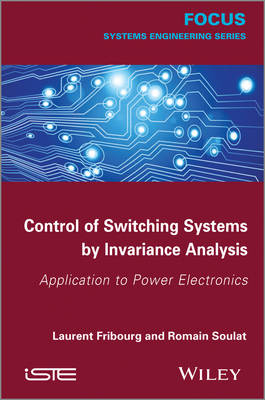
Control of Switching Systems by Invariance Analysis
ISTE Ltd and John Wiley & Sons Inc (Verlag)
978-1-84821-606-8 (ISBN)
This book presents correct-by-design control techniques for switching systems, using different methods of stability analysis. Switching systems are increasingly used in the electronics and mechanical industries; in power electronics and the automotive industry, for example. This is due to their flexibility and simplicity in accurately controlling industrial mechanisms. By adopting appropriate control rules, we can steer a switching system to a region centered at a desired equilibrium point, while avoiding “unsafe” regions of parameter saturation.
The authors explain various correct-by-design methods for control synthesis, using different methods of stability and invariance analysis. They also provide several applications of these methods to industrial examples of power electronics.
Contents
1. Control Theory: Basic Concepts.
2. Sampled Switched Systems.
3. Safety Controllers.
4. Stability Controllers.
5. Application to Multilevel Converters.
6. Other Issues: Reachability, Sensitivity, Robustness and Nonlinearity.
About the Authors
Laurent Fribourg is head of the LSV (Laboratoire Spécification et Vérification) and Scientific Coordinator of the Institut Farman, Institut Fédératif de Recherche CNRS, which brings together the expertise of five laboratories from ENS Cachan, in France, in the fields of modeling, simulation and validation of complex systems. He has published over 70 articles in international journals and reviewed proceedings of international conferences, in the domain of the theory of formal methods and their industrial applications.
Romain Soulat is in the third year of his doctorate at the LSV at ENS Cachan in France, under the supervision of Laurent Fribourg. He is working on the modeling and verification of hybrid systems. In particular, his interests concern robustness in scheduling problems – especially as part of a collaborative project with EADS Astrium on the verification of a component in the launcher for the future Ariane 6 rocket. He has published 5 articles in reviewed proceedings of international conferences.
Laurent Fribourg is head of the LSV (Laboratoire Spécification et Vérification) and Scientific Coordinator of the Institut Farman, Institut Fédératif de Recherche CNRS, which brings together the expertise of five laboratories from ENS Cachan, in France, in the fields of modeling, simulation and validation of complex systems. He has published over 70 articles in international journals and reviewed proceedings of international conferences, in the domain of the theory of formal methods and their applications. Romain Soulat is in the third year of his doctorate at the LSV at ENS Cachan in France, under the supervision of Laurent Fribourg. He is working on the modeling and verification of hybrid systems. In particular, his interests concern robustness in scheduling problems – especially as part of a collaborative project with EADS Astrium on the verification of a component in the launcher for the future Ariane 6 rocket. He has published 5 articles in reviewed proceedings of international conferences.
PREFACE ix
ACKNOWLEDGMENTS xi
INTRODUCTION xiii
CHAPTER 1. CONTROL THEORY: BASIC CONCEPTS 1
1.1. Model of control systems 1
1.2. Digital control systems 3
1.2.1. Digitization 3
1.2.2. Quantization 6
1.2.3. Switching 6
1.3. Control of switched systems using invariant sets 8
1.3.1. Controlled invariants 9
1.3.2. Safety control problem 9
1.3.3. Stability control problem 10
1.3.4. Other controllers 11
1.4. Notes 11
CHAPTER 2. SAMPLED SWITCHED SYSTEMS 13
2.1. Model 13
2.2. Illustrative examples 18
2.3. Zonotopes 21
2.4. Notes 23
CHAPTER 3. SAFETY CONTROLLERS 25
3.1. Backward fixed point computation (direct approach) 26
3.2. Approximate bisimulation (indirect approach) 29
3.3. Application to a three-cell Boost DC–DC converter 35
3.3.1. Model 35
3.3.2. Direct method 37
3.3.3. Indirect method 37
3.4. Notes 40
CHAPTER 4. STABILITY CONTROLLERS 41
4.1. Motivation 42
4.2. Preliminaries 42
4.2.1. Control induced by the decomposition 45
4.3. Decomposition function 46
4.3.1. Basic procedure 46
4.3.2. Enhancement for safety 48
4.4. Limit cycles 52
4.4.1. Discussion of the assumptions H1 and H2 53
4.4.2. Illustrative examples 54
4.5. Implementation 58
4.6. Notes 59
CHAPTER 5. APPLICATION TO MULTILEVEL CONVERTERS 61
5.1. Multilevel converters 62
5.2. Application of the decomposition procedure 62
5.2.1. Five-level converter 63
5.2.2. Seven-level converter 67
5.3. Physical experimentations 70
5.4. Notes 73
CHAPTER 6. OTHER ISSUES: REACHABILITY, SENSITIVITY, ROBUSTNESS AND NONLINEARITY 75
6.1. Reachability control 75
6.2. Sensitivity 78
6.3. Robust safety control 79
6.4. Nonlinearity 82
6.5. Notes 87
CONCLUSIONS AND PERSPECTIVES 89
APPENDIX 1. SUFFICIENT CONDITION OF DECOMPOSITION 93
APPENDIX 2. APPLICATIONS OF THE ENHANCED DECOMPOSITION PROCEDURE 97
APPENDIX 3. PROOF OF THEOREM 4.3 103
APPENDIX 4. EXAMPLE WITH |R∗Δ| = ∞ 107
APPENDIX 5. CODE 109
BIBLIOGRAPHY 121
INDEX 127
| Verlagsort | London |
|---|---|
| Sprache | englisch |
| Maße | 163 x 241 mm |
| Gewicht | 395 g |
| Themenwelt | Technik ► Elektrotechnik / Energietechnik |
| ISBN-10 | 1-84821-606-8 / 1848216068 |
| ISBN-13 | 978-1-84821-606-8 / 9781848216068 |
| Zustand | Neuware |
| Haben Sie eine Frage zum Produkt? |
aus dem Bereich


